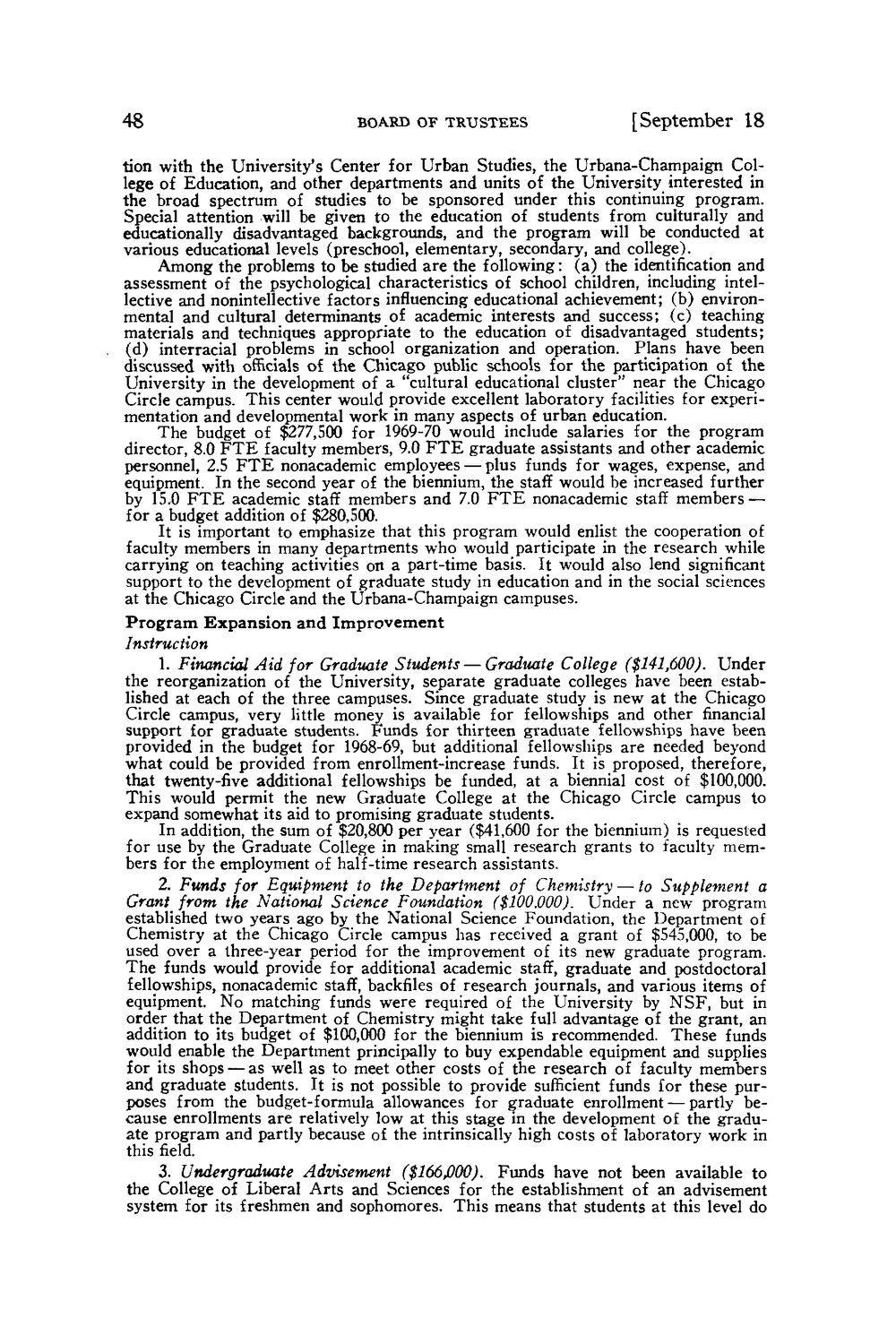| |
| |
Caption: Board of Trustees Minutes - 1970
This is a reduced-resolution page image for fast online browsing.

EXTRACTED TEXT FROM PAGE:
48 BOARD OF TRUSTEES [September 18 tion with the University's Center for Urban Studies, the Urbana-Champaign College of Education, and other departments and units of the University interested in the broad spectrum of studies to be sponsored under this continuing program. Special attention will be given to the education of students from culturally and educationally disadvantaged backgrounds, and the program will be conducted at various educational levels (preschool, elementary, secondary, and college). Among the problems to be studied are the following: (a) the identification and assessment of the psychological characteristics of school children, including intellective and nonintellective factors influencing educational achievement; (b) environmental and cultural determinants of academic interests and success; (c) teaching materials and techniques appropriate to the education of disadvantaged students; (d) interracial problems in school organization and operation. Plans have been discussed with officials of the Chicago public schools for the participation of the University in the development of a "cultural educational cluster" near the Chicago Circle campus. This center would provide excellent laboratory facilities for experimentation and developmental work in many aspects of urban education. The budget of $277,500 for 1969-70 would include salaries for the program director, 8.0 F T E faculty members, 9.0 F T E graduate assistants and other academic personnel, 2.5 F T E nonacademic employees — plus funds for wages, expense, and equipment. In the second year of the biennium, the staff would be increased further by 15.0 F T E academic staff members and 7.0 F T E nonacademic staff members — for a budget addition of $280,500. It is important to emphasize that this program would enlist the cooperation of faculty members in many departments who would participate in the research while carrying on teaching activities on a part-time basis. It would also lend significant support to the development of graduate study in education and in the social sciences at the Chicago Circle and the Urbana-Champaign campuses. Program Expansion and Improvement Instruction 1. Financial Aid for Graduate Students — Graduate College ($141,600). Under the reorganization of the University, separate graduate colleges have been established at each of the three campuses. Since graduate study is new at the Chicago Circle campus, very little money is available for fellowships and other financial support for graduate students. Funds for thirteen graduate fellowships have been provided in the budget for 1968-69, but additional fellowships are needed beyond what could be provided from enrollment-increase funds. It is proposed, therefore, that twenty-five additional fellowships be funded, at a biennial cost of $100,000. This would permit the new Graduate College at the Chicago Circle campus to expand somewhat its aid to promising graduate students. In addition, the sum of $20,800 per year ($41,600 for the biennium) is requested for use by the Graduate College in making small research grants to faculty members for the employment of half-time research assistants. 2. Funds for Equipment to the Department of Chemistry — to Supplement a Grant from the National Science Foundation ($100,000). Under a new program established two years ago by the National Science Foundation, the Department of Chemistry at the Chicago Circle campus has received a grant of $545,000, to be used over a three-year period for the improvement of its new graduate program. The funds would provide for additional academic staff, graduate and postdoctoral fellowships, nonacademic staff, backfiles of research journals, and various items of equipment. No matching funds were required of the University by N S F , but in order that the Department of Chemistry might take full advantage of the grant, an addition to its budget of $100,000 for the biennium is recommended. These funds would enable the Department principally to buy expendable equipment and supplies for its shops — as well as to meet other costs of the research of faculty members and graduate students. It is not possible to provide sufficient funds for these purposes from the budget-formula allowances for graduate enrollment — partly because enrollments are relatively low at this stage in the development of the graduate program and partly because of the intrinsically high costs of laboratory work in this field. 3. Undergraduate Advisement ($166,000). Funds have not been available to the College of Liberal Arts and Sciences for the establishment of an advisement system for its freshmen and sophomores. This means that students at this level do
| |